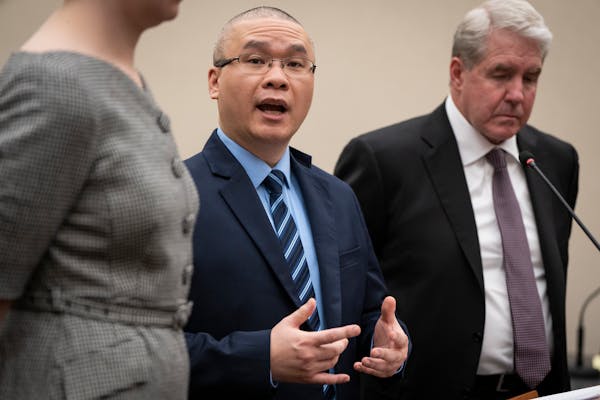On the same day a former Minneapolis Police Department officer was sentenced in the death of George Floyd, Chief Brian O'Hara announced a new structure for the department intended to improve community trust.
Starting Monday, the department was split into two divisions: one for operations and the other for community trust.
Those divisions are led by two newly created assistant chief positions. Both were appointed from within the department: Christopher Gaiters, the new assistant chief of community trust, and Katie Blackwell, assistant chief of operations.
O'Hara said that since taking over as chief in November he realized "significant organizational structure changes were needed." He said the restructuring enables the department to have "greater accountability" over efforts to reduce crime and restore trust.
The chief said it became apparent the department had too many supervisors on the lower rungs and needed more staff in executive positions to resemble more of a "logical staircase," O'Hara said.
"This increases the amount of people available on the executive level to provide accountability, and that's absolutely necessary," O'Hara said at the Monday news conference.
Asked about criticisms of the department's past internal investigations, Gaiters said he wants to put emphasis on listening to community voices and factoring those into decisions.
"I think it's extremely important that [within] the decisions and outcomes in internal affairs is the expectation of the community," Gaiters said, noting there have been many cases in the past where the department could have better included the input of the local community.
A U.S. Department of Justice investigation prompted by Floyd's murder and released in June found that the department routinely engages in a pattern of racist and abusive behavior that deprives people of their constitutional rights.
The 89-page report outlined four core findings: The department uses excessive force, including unjustified deadly force; it unlawfully discriminates against Black and Native American people; it violates citizens' free speech rights; and officers discriminate against people with behavioral health disabilities when responding to calls, at times causing trauma or death.
U.S. Attorney General Merrick Garland called the patterns and practices observed by the Justice Department "deeply disturbing."
"They erode the community's trust in law enforcement. And they made what happened to George Floyd possible," Garland said at a June 16 news conference in Minneapolis.
O'Hara said the new structure and how it can improve racial equity when it comes to treatment by police is "definitely something that's on my mind as I make all these decisions."
As assistant chief of community trust, Gaiters will also oversee two new bureaus announced last week: the Bureau of Internal Affairs and the Bureau of Constitutional Policing.
Those bureaus will be led by two newly appointed deputy chiefs: DeChristopher Granger, overseeing Internal Affairs, and Travis Glampe, overseeing the Constitutional Policing Bureau. Granger was previously a commander for Internal Affairs.
Blackwell said the department needs to be "strategic and deliberate" with its operations, noting that the department is "shorter staffed than we ever have been before." She echoed O'Hara's view that having more executive-level positions should help with department accountability.
"That help and that assistance of making sure nothing is slipping through the cracks, that's a huge piece of that accountability piece," she said.
The news came the same day that former officer Tou Thao was sentenced to nearly five years in prison for aiding in George Floyd's killing in 2020.
O'Hara announced he was also reassigning several of the department's deputy chief positions. Jason Case, a former commander, will lead the investigations bureau; Deputy Chief Jon Kingsbury, also a former commander, will lead the patrol division; and Mark Montgomery will lead the professional standards division.
The new deputy chief positions will have an annual salary range between $153,524 and $181,995.
Three unreappointed deputy chiefs — Erick Fors, Kathy Waite and Troy Schoenberger — will return to their civil-service ranks.
Other new leadership positions announced were Second Precinct Inspector Nick Torborg and Fifth Precinct Inspector Christie Nelson.
The federal findings are separate from similar charges leveled in 2022 by the Minnesota Department of Human Rights, which also found a pattern of discriminatory behavior by Minneapolis officers in the decade before Floyd's killing in 2020. The Minneapolis City Council approved changes this spring to settle the state's case, including limiting police use of chemical irritants and barring officers from searches based on the smell of marijuana.
Amelia Huffman, former acting assistant chief, is now employed at the Minneapolis City Attorney's Office, where she is tasked with implementing police reforms mandated by the state and the federal consent decree in response to Floyd's murder.
Staff writers Stephen Montemayor and Liz Navratil contributed to this report.

Want to share info with the Star Tribune? How to do it securely

'Safe recovery sites' would offer syringes, naloxone and more to people using drugs. The plan could be in peril.
New Minnesota GOP leaders seek peace with party's anti-establishment wing

Who is Republican Lisa Demuth, Minnesota's first House speaker of color?

